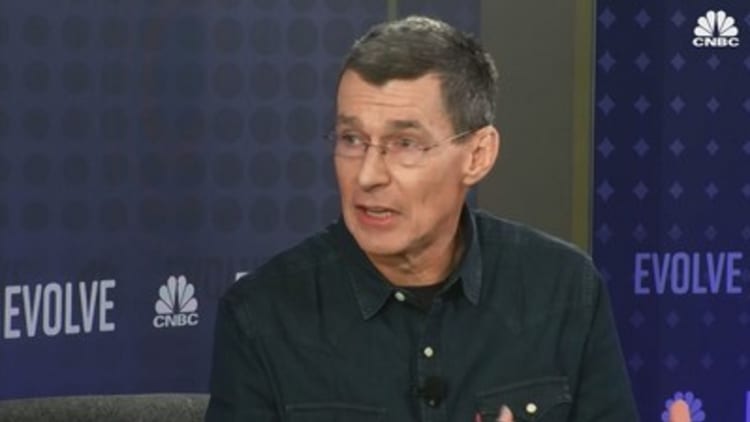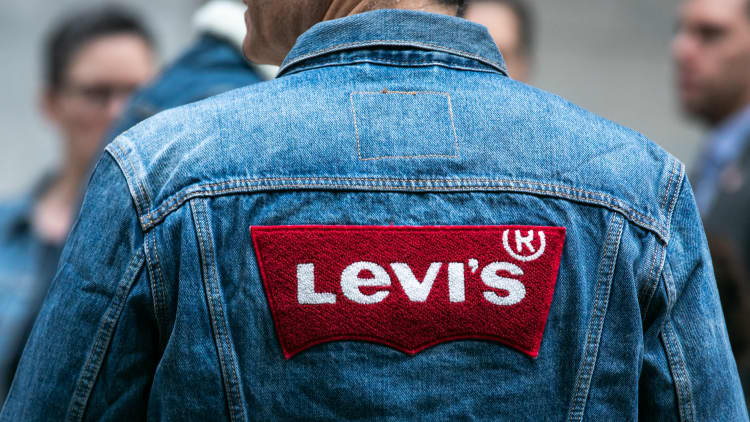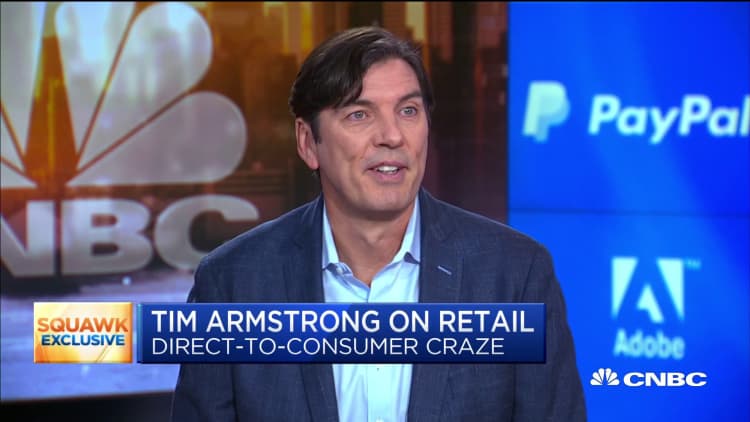
"I personally believe that the best innovation happens when you've got constraints," Levi Strauss CEO Chip Bergh said on CNBC's "Mad Money" the night before an appearance at the CNBC Evolve summit in Los Angeles on Tuesday. "Completely unconstrained, an innovation organization can just get lost in the weeds."
One physical constraint that the CEO of the 166-year-old denim brand thinks has a major innovation in store is body size.
"Sizes will go out the window 10 years from now," Bergh said at CNBC Evolve. "Everyone can do their own body scan on a camera."
When Bergh took over Levi Strauss in 2011, one of the things he was surprised to discover was the location of its innovation center: Turkey.
"I used to say, 'We're at the northern tip of Silicon Valley. How do we attract all the Silicon Valley talent and innovation to work with Levi's?'" Bergh told CNBC's Jim Cramer. "They're not going to do it if they have to go all the way to Turkey."
The CNBC Evolve Summit returns to LA on June 9, 2020. Registration for this event is now open.
In 2013, Levi Strauss opened its Eureka Innovation Lab located near its San Francisco headquarters. Bergh sees innovation as one of the three big business shifts he brought to the company, including a move to direct e-commerce and branded store sales, as well as a renewed focus on women's clothing.

The Eureka Innovation Lab has been responsible for the company's Water<Less technology and its project F.L.X.
Water<Less technology has saved more than 3 billion liters of water in the finishing of jeans. Project F.L.X., Levi's process of using lasers to finish a pair of jeans, gives the pants the look that consumers want, reduces the time it takes to make jeans, as well as the physical labor and chemicals needed to complete the process. The company says the typical process uses a few thousand chemical formulations, which project F.L.X. reduces to just a few dozen.
It's the laser technology that plays into the future of custom sizing and orders. The lasers allow jeans to be finished at distribution centers rather than centralized manufacturing facilities, which opens the door to custom orders.
"It is informational, revolutionary, and it will change the supply chain over time because we can postpone the finishing of a pair of jeans closer to market," Bergh told CNBC's Mad Money.
The laser technology, which was first introduced in 2018, uses advanced imaging to cut finishing design and development time in half, from months to weeks and sometimes as little as days, according to the denim company. Digital files can be sent directly to a vendor and quickly scaled in manufacturing. Pushing off the final design decisions until much later in the process will ultimately allow for the era of personalized sizing.
Levi's is one of many big retail brands pushing technology into a new era of custom sizing. Nike launched a customized shoe-sizing technology earlier this year. Many retail start-ups also are seeing opportunity in new approaches to customer sizing, such as bra start-up ThirdLove.
Tim Armstrong, former AOL CEO and founder of dtx company, told CNBC in an interview ahead of his appearance at the CNBC Evolve summit that ThirdLove has three or four times the sizes of Victoria's Secret. The company is able to offer greater customization because the business was built from scratch to be a direct-to-consumer company, including the infrastructure, communications and unit economics. Everything is constructed to match the consumer, not the wholesaler, Armstrong said.

"Using the data that we collect and algorithms that we've developed internally, we'll recommend her size down to the half-cup and the style meant for her body," ThirdLove CEO Heidi Zak told CNBC earlier this year. "So with every woman who does our Fit Finder, we get smarter and smarter, and we've had over 10 million women do our Fit Finder."
More from Evolve:
Method, Olly, now Welly. Serial entrepreneur Eric Ryan reveals the secret behind his billion-dollar success story
Walmart CEO Doug McMillon: 'We could go away at any minute'
Anheuser-Busch invests $100 million in hard seltzer, the new drink craze






